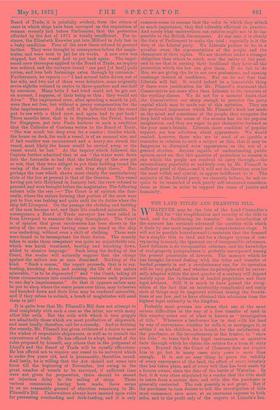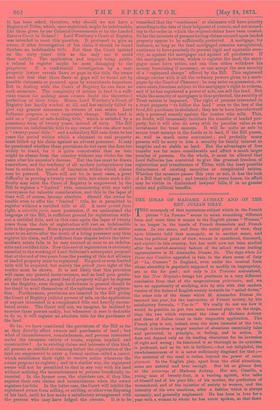THE LAND TITLES AND TRANSFER BILL.
WHATEVER may be the fate of the Lord Chancellor's Bill for "the simplification and security of the title to
land, and for facilitating its transfer," the introduction of the measure has certainly advanced the question with which it deals by one most important and comprehensive stage. It will not be possible henceforward to maintain that the demand for a simpler title to land and for a cheaper system of con- veyancing is merely the ignorant cry of -irresponsible reformers. Lord Selborne is no irresponsible reformer, and his knowledge of real-property jurisprudence is probably unsurpassed among the present generation of lawyers. The measure which he has brought forward dealing with the titles and transfer of landed property is not a revolutionary one, for its operation will be very gradual, and whether its principles will be univer- sally adopted within the next quarter of a century will depend mainly upon the inclination of landed proprietors and' their legal advisers. Still it is much to have gained the recog- nition of the fact that an intolerably complicated and costly state of things may be improved without loosing the founda- tions of our law, and to have obtained this admission from the highest legal authority in the kingdom.
Probably most persons are aware that one of the most serious difficulties in the way of a free transfer of land in this country arises out of what is known as "investigation of title." Whenever a landowner has to deal with his land by way of conveyance, whether he sells it, or mortgages it, or settles it on his children, he is bound, for the satisfaction of the purchaser, or the incumbrancer, or the trustee, to "show his title," to trace back the legal instruments or operative facts through which he claims his estates for a term of sixty years. Beyond this the Court of Chancery does not require him to go, but in many cases sixty years is more than enough. It is not an easy thing to prove the validity of every conveyance of the land, the effect of every intestacy that has taken place, and of every will that has been made by a former owner, since the date of the battle of Waterloo. In fact, it 1 very often stipulated by a vendor that the title shall be taken from a certain date, and with this the purchaser is generally contented. The risk possibly is not great. But if the purchaser in turn desires to sell, the investigation of title must commence once more, at an enormous expense to both sides, and to the profit only of the experts at Lincoln's Inn. It has been asked, therefore, why should we not have a Registry of Titles, which, once registered, might be indefeasible, like those given by our Colonial Governments or by the Landed Estates Court in Ireland ? Lord Westbury's Court of Registry was intended to meet this question. It professed to give an owner, if after investigation of his claim it should be found flawless, an indefeasible title. But then the Court insisted on the sixty years' title as the only one it could thus certify. The application and inquiry being public, a refusal to register might be most damaging to the proprietor. If a confidential investigation by a real- property lawyer reveals flaws or gaps in the title, the owner need not fear that these flaws or gaps will be found out by possible claimants or pounced upon by extortionate impostors. But in dealing with the Court of Registry he can have no such assurance. The complexity of estates in land is a suffi- cient reason for making most owners doubt the theoretical perfection of their titles. Hence, Lord Westbury's Court of Registry has hardly worked at all, and has entirely failed to give any general assurance to owners of real estate. Lord Selborne proposes a very important change. Much land is sold on a "good or safe-holding title," which is satisfied by a possessory term of twenty years, instead of sixty. The Bill promises an indefeasible title to any owner who can show such a "twenty-years' title ; " and a subsidiary Bill cuts down to ten years the period within which a claimant to real property must follow up his claim against an adverse possessor. It may be questioned whether these provisions do not open the door too widely to fraud, for it is quite conceivable that an heir might be absent from the country without any blokes for ten sears after his ancestor's decease. But the line must be drawn somewhere, and the tendency of all modern jurisprudence has been to reduce the period of limitation within which claims may be pursued. There will not be, in most cases, a great difficulty in proving a twenty years' title, but where such a dif- ficulty may exist the Court of Registry is empowered by the Bill to register a " limited " title, commencing with any valid conveyance for valuable consideration, and this in the lapse of time will, of course, become absolute. Should the owner be unable even to offer the " limited " title, he is permitted to register without a certified title at all. A mere prima facie right, a scintilla juris, mere possession, if we understand the language of the Bill, is sufficient ground for registration with- out a certified title, and in this case again the lapse of twenty years from the date of registration will vest an indefeasible title in the possessor. Even a person entitled under will or settle- ment to an estate after the death of a living possessor may thus register his claim, and if sufficient time elapses before the inter- mediate estate falls in he may succeed at once to an indefea- sible and certified title. Now this sort of registration is obviously -essential to the working of Lord Selborne's subsequent proposal that at the end of two years from the passing of this Act all sales -of landed property must be registered. No good or even limited title will be required, but merely the primd facie right of the vendor must be shown. It is not likely that this provision will cause any general inconvenience, and as land goes gradu- ally into the market, a great deal of property will get by degrees on the Registry, even though landowners in general should be too timid to avail themselves of the optional terms of registra- tion. Furthermore, provisions are inserted in the Bill giving the Court of Registry judicial powers of sale, on the application of anyone interested in a complicated title and heavily encum- bered estate. The Court will not, we imagine, be inclined to exercise these powers rashly, but whenever it sees it desirable to do so, it will register an absolute title for the purchaser of the land.
So far, we have considered the provisions of the Bill as far • as they directly affect owners and purchasers of land ; but what of incumbrancers, remaindermen, and persons interested under the immense variety of trusts, express, implied, and constructive ? As to existing claims and interests of this kind, all persons so entitled or claiming before the registration of the land are empowered to enter a. formal caution called a caveat, 'which establishes their right to receive notice whenever the owner proposes to register ; and in a similar way, the registered owner will not be permitted to deal in any way with his land without noticing the incumbrancers or persons beneficially in- terested. In the former case, the objectors can, if they like, register their own claims and incumbrances when the owner registers his title. In the latter case, the Court will inhibit the registered owner from selling, or settling, or otherwise disposing .of his land, until he has made a satisfactory arrangement with the persons who may have lodged the caveats. It is to be
remarked that the "cautioners" or claimants will have priority according to the date of their lodgment of caveats, and not accord- ing to the order in which the original claims have been created. So far the interests of persons having claims secured upon landed property appear to be sufficiently protected. A mortgage, for instance, so long as the land mortgaged remains unregistered, continues to have precisely its present legal and equitable secu- rity, as against the mortgagor and against all purchasers. If the mortgagor, however, wishes to register the land, the mort- gagee must have notice, and can then either withdraw his money, foreclosing if necessary, or can accept the new security of a "registered charge" offered by the Bill. This registered charge carries with it all the ordinary powers given to a mort- gagee by the Court of Chancery; he may enter on possession, re- ceive rents, foreclose subject to the mortgagor's right to redeem, and if he has registered a power of sale, can sell the land: But while the security of mortgages is thus protected, the security of Trust estates is impaired. The right of persons interested in a trust property "to follow the land" even to the loss of the bond fide purchaser is abolished ; they are to have henceforward only a personal remedy against the trustee who sells. This, no doubt, will immensely facilitate the transfer of landed pro- perty, but it will also do away with its peculiar value as an investment for trust moneys. It will be quite as safe to secure trust moneys in the funds as in land, if the Bill passes, as well as much more convenient ; and probably many persons will be sorry to lose a security for family interest so tangible and so stable as land. But the advantages of free transfer are far more considerable and affect a much larger number of persons. On the whole, it must be allowed that Lord Selborne has contrived to give the greatest freedom of registration and transference of Titles, with the least possible disturbance of existing securities or complicated estates. Whether the measure passes this year or not, it has the look of a Bill that will pass ; and twenty-five years hence, its effect may be visible in diminished lawyers' bills, if in no greater social and political benefits.



































 Previous page
Previous page